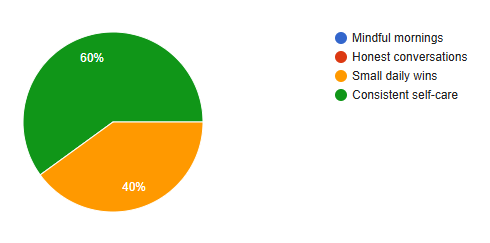- ABC of Mental Health
- Posts
- Is your Motivation Hibernating?
Is your Motivation Hibernating?
ABC of Mental Health

Hello! Welcome to another edition of ABC of Mental Health, your partner in the journey to better mental health, one newsletter at a time.
Some days you wake up ready to take on the world. Other days, even replying to one message feels like effort. If you’ve been feeling low-energy, unfocused, or uninterested in things you normally care about, your motivation may simply be… in hibernation. This week, we explore why motivation dips, and how to gently wake it up, instead of forcing a comeback.
If you like what you read here, click to share this newsletter via WhatsApp today! 😊
One relevant recommendation:
Try the 5-Minute Rule
When motivation feels asleep, don’t chase big goals. Shrink tasks, not your self-worth. Pick one thing, and do it for just 5 minutes: a walk, journaling, tidying one drawer, replying to one email.
Two Quotes on Rekindling Motivation:
The following quote is often attributed to the legendary Statesman Winston Churchill:
“Success is not final, failure is not fatal: it is the courage to continue that counts.”
According to ancient Chinese Philosopher Lao Tzu, founder of Taoism:
“Nature does not hurry, yet everything is accomplished.”
Three TherapyShorts from TST
Motivation Isn’t a Switch; It’s a Cycle
Motivation isn’t something you turn on and off; it moves in natural cycles. Some days you’re energised and focused, and other days your mind feels foggy or slow. A dip in motivation doesn’t mean you’re failing or falling behind. It often means your brain is resting, repairing, or recalibrating after stress, overstimulation, or emotional heaviness. Instead of resisting the slowdown, try acknowledging it. Your mind may simply be signalling that it needs time. Trust the cycle, energy always returns when you stop forcing and start listening.You Don’t Have to Feel Motivated to Start
Waiting for motivation to magically appear can keep you stuck for days or weeks. Instead, let action come first. Begin with something tiny: one email, a two-minute stretch, organising one corner of your desk. Small actions create a sense of progress, and that progress slowly builds confidence. Confidence then wakes up motivation, not the other way around. When everything feels overwhelming, shrink the task, not your expectations of yourself. Gentle, low-pressure action is often enough to break the inertia and help your mind find its rhythm again.Self-Judgment Drains Energy and Rest Replenishes it
Feeling unproductive often leads to guilt, but self-criticism only exhausts you further. When you’re already low on energy, adding shame creates an emotional overload that makes it harder to move. Instead of asking, “What’s wrong with me?” try asking, “What do I need right now?” Maybe it’s rest, structure, connection, or a small win. Meeting yourself with compassion reduces resistance and helps your brain reset. Remember, rest is not the opposite of productivity, it’s part of it. Kindness toward yourself brings back clarity far faster than judgment ever will..
A QUICK QUESTION…
What feels hardest to do when motivation dips? Vote here!
Last week, we asked you what was one habit that makes you feel sucessful on your own terms, and the responses were… (drumroll please)…

With care and compassion,
The Social Therapist
Reply